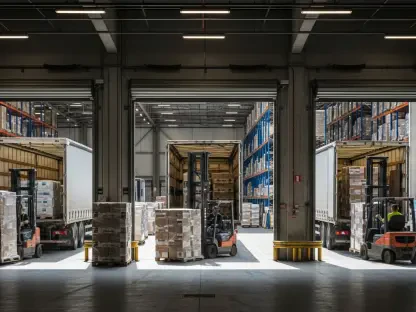Setting the Stage for Transformation in UK Fleet Operations
In the dynamic landscape of UK fleet management, a staggering statistic emerges: nearly 130,000 road casualties were reported in 2024, underscoring a critical need for innovative solutions to enhance safety and efficiency. As businesses grapple with escalating operational costs, a projected shortage of 200,000 Heavy Goods Vehicle (HGV) drivers over the next five years, and stringent environmental mandates, the integration of artificial intelligence (AI) offers a transformative pathway. This market analysis delves into how AI-powered platforms, exemplified by cutting-edge solutions, are reshaping the sector. By addressing immediate challenges like driver safety and cost optimization, alongside long-term goals such as sustainability, this exploration aims to illuminate key trends, data-driven insights, and projections that could redefine physical operations across transportation, construction, and energy industries in the UK.
Dissecting Market Dynamics: Current Challenges and AI Opportunities
Navigating the Complexities of Driver Shortages and Safety Concerns
The UK fleet management market faces persistent headwinds, with labor shortages posing a significant barrier to operational continuity. Industry reports highlight a looming deficit of HGV drivers, compounded by rising road safety issues that strain both human and financial resources. Traditional methods, often reliant on manual oversight and fragmented systems, fall short in providing real-time solutions to prevent accidents or address driver behavior. AI technologies step into this gap with capabilities to monitor risky actions, such as distracted driving, and deliver instant feedback, potentially reducing collision rates. However, adoption hurdles like driver resistance to monitoring and privacy concerns must be navigated to ensure these tools gain traction in a market desperate for safer roads.
Cost Pressures and the Push for Operational Efficiency
Beyond safety, the economic burden of fleet operations continues to mount with soaring fuel, maintenance, and insurance costs. Data suggests that inefficient routing and unexpected vehicle breakdowns contribute significantly to these expenses, draining budgets for companies of all sizes. AI-driven fleet management systems offer a lifeline by leveraging predictive analytics to anticipate maintenance needs and optimize travel paths, thereby curbing unnecessary expenditure. While the promise of slashing operational costs is evident, the risk of over-dependence on technology without human judgment remains a concern. The balance between automation and strategic oversight will likely shape the success of these solutions in the competitive UK market.
Regulatory Mandates and the Shift Toward Sustainability
Environmental regulations, particularly the UK’s 2030 Zero Emission Vehicle Mandate, add another layer of complexity to fleet management. Transitioning to electric vehicles (EVs) is no small feat, given that repairs for EVs can cost up to 25% more and take 14% longer than for traditional vehicles. AI platforms are emerging as critical enablers in this shift, providing tools for EV forecasting, fuel-efficient routing, and managing mixed fleets. Despite these advancements, the challenge of integrating sustainable practices into existing operations persists, especially for smaller firms with limited budgets. Market trends indicate that scalable AI solutions could bridge this gap, making green initiatives more accessible across diverse industry segments.
Forecasting the Future: AI as a Catalyst for Fleet Evolution
Emerging Trends in Integrated Technology Adoption
Looking ahead, the UK fleet management sector appears poised for a significant shift toward integrated AI platforms that consolidate safety, efficiency, and sustainability tools. Unlike the siloed systems of the past, these comprehensive solutions promise actionable insights through a unified interface, streamlining decision-making for fleet operators. Projections suggest that within the next decade, adoption rates for such technologies could rise sharply, driven by the need to address multifaceted challenges like labor shortages and regulatory compliance. As businesses seek to modernize, the trend toward data-driven operations will likely become a cornerstone of competitive advantage in this space.
Technological Advancements and Predictive Capabilities
Advancements in AI are expected to deepen its impact on fleet management, particularly through enhanced predictive analytics. Future iterations of these platforms could offer even more precise insights into vehicle health, driver patterns, and market conditions, enabling proactive rather than reactive strategies. Economic factors, such as fluctuating fuel prices, further underscore the value of such foresight in maintaining profitability. While upfront investment costs and data privacy issues present barriers, the long-term benefits of reduced downtime and optimized resources make a compelling case for widespread integration of these cutting-edge tools over the coming years.
Regulatory and Economic Influences Shaping Adoption Rates
Regulatory changes, including stricter emissions standards, are anticipated to accelerate the uptake of AI solutions in fleet management. Coupled with economic pressures like rising labor costs, these factors create a fertile ground for automation to take root. Market analysis points to a growing consensus that AI will not replace human roles but rather augment them, enhancing workforce productivity through automated scheduling and compliance tasks. As the industry evolves, adaptability to regional policies and market-specific needs will be crucial for technology providers aiming to capture significant market share in the UK.
Reflecting on Insights: Strategic Pathways for UK Fleets
Looking back on this analysis, it is evident that AI has begun to carve a transformative path for UK fleet management, tackling deep-seated issues from safety to sustainability with remarkable precision. The examination of market trends revealed a clear shift toward integrated platforms that promise efficiency in an era of mounting challenges. Key implications point to the necessity of balancing technological reliance with human oversight to maximize benefits. For fleet operators, the actionable next step involves piloting AI tools to address specific pain points, such as high insurance costs or EV transition hurdles. Engaging with regional expertise to tailor solutions to local regulations offers another avenue for success. Ultimately, the journey ahead hinges on strategic investments in technology that not only solve immediate operational woes but also build resilience for an increasingly complex future.









